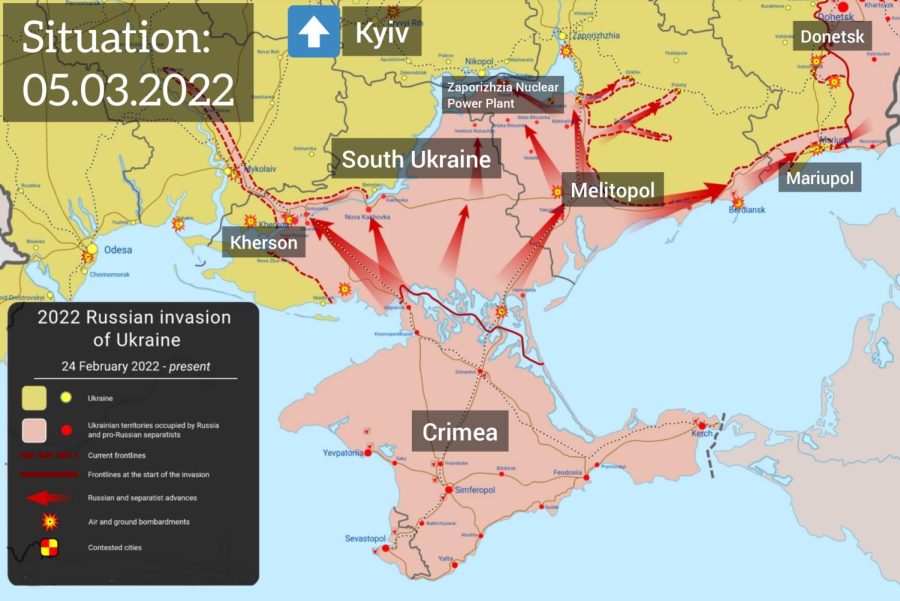Russian-Ukrainian conflict hits close to home
Fogener Haus, CC BY-SA 4.0
A map showing the troop movement of the Russians into Ukraine.
March 11, 2022
On the afternoon of February 24, Vladimir Putin announced that he had launched “Special Military Operations“ to invade Ukraine.
A full-scale invasion, conducted in the sea, air, and ground, was seen first by the people of Ukraine which started off with constant artillery shelling during the night and day followed by mobilized Russian Armed Forces moving in and capturing individual cities. Ukraine’s president, Volodymyr Zelenksyy, has called on his nation’s allies, civilians, and onlookers to do everything possible to aid them during the crisis.
CNN reported that US President Joe Biden, along with many other nations, condemned the military incursion by imposing sanctions such as implementing restrictions on Russia’s central bank to support the inability of aiding Putin’s war effort, freezing all Russian assets in different countries, and shutting down gas and oil pipelines going in and out of the country.
Ukrainian citizens are not going down without a fight. Veterans of the Ukraine Military, teens, and foreigners are aiming to assist their country in keeping Putin out. More than 25,000 automatic rifles, along with 10 million rounds of ammunition and RPG’s (rocket propelled grenades) have been handed out for people to defend their homeland. Glass bottle manufacturers all across Ukraine halted the production of their goods to aid the citizens’ efforts in making the most available yet easiest weapon to construct; the molotov cocktail.
The invasion of Ukraine is bringing along much controversy. Some videos and photos that have been posted to social media every day since the start of the invasion are believed to reveal war crimes being committed by the Russian Armed Forces. Some include Russian aircraft firing unguided missiles into residential areas, artillery shelling on hospitals and apartments, in addition to tanks running over civilian vehicles.
This war is affecting many people across the globe even right here at Ritenour High School. The 11th grade counselor Iliana Vayman, who is Ukrainian, has family and loved ones that live in Ukraine who are heavily affected.
“I have family in Ukraine who spend their day and nights in underground bomb shelters and I know multiple people who have died from attacks,” Vayman said. “For my loved ones here, everyone is not sleeping, very anxious, and are trying to find the best solution, even though it seems there are none.”
Junior Alexander Khatalyan is a foreign exchange student from Armenia, a country that is about 900 miles from Ukraine. He believes that the whole world needs to be paying attention to this conflict, as well as others that are taking place close to the region.
“Regardless of where those conflicts are happening, it will always affect me as a global citizen knowing that there are people who don’t have the peace I get to experience and that makes me feel blue,” Khatalyan said. “The main focus shouldn’t only be about the Russian-Ukraine war, the smaller conflicts that don’t get as much attention such as Palestine, Syria, Artsakh and many other smaller conflicts too should be in the spotlight as well. I have many friends in Ukraine that are now displaced due to the conflict. My thoughts and prayers are always with them.”
For now, Khatalyan and Vayman can do nothing much more than other Americans by sitting and watching as the war continues in Ukraine, even though their friends and family could have their lives totally overturned.
“It’s horrible and it’s hard to imagine people you know are involved in a war that they didn’t ask for. It’s hard to focus on day-to-day activities since you’re constantly anxious and hoping that you don’t get a phone call that one of your loved ones has died,” Vayman said.


